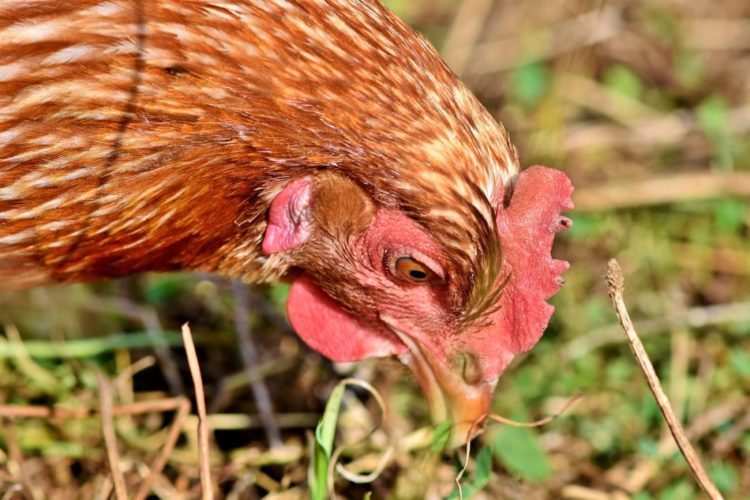Generally healthy chickens with strong immune systems can handle a moderate worm load, but even still you can choose a natural chicken deworming method to help keep your birds healthy. Most backyard flocks, whether they are free roaming or kept in a coop, are likely to encounter worms at some point in their life because of the environment they live in and the amount of time they spend poking around in the sand.
It only becomes a problem when the body can’t manage the worms and they get out of control.
Signs your chickens might have worms include:
- Visible proof of worms in their droppings which may be foamy or extremely watery;
- Dirty feathers around the vent;
- Pale yolks in the eggs;
- Decreased egg production;
- Weight loss;
- Increased feed consumption;
- Fatigue and lack of energy;
- Pale comb and wattles;
- Ruffled feathers and overall dishevelled appearance.
Worms are parasites that establish themselves in your chicken’s digestive system. They sap chickens of nutrients as well as causing your girls grave discomfort. There are many different types of worms, like hair worms, round worms, gizzard worms and tape worm.
There are chemical dewormers but many smallholders might prefer to use natural deworming remedies.

One can use Diatomaceous Earth which works when powdering your chickens with it to get rid of external mites and lice, but it also works in getting rid of internal parasites. It is a very dense source of essential minerals that will help keep your girls lively and healthy. Add a cup of it to the chickens’ food ~ it does not affect the flavour and the hens happily eat it.
Garlic is often suggested as a dewormer. Place crushed garlic pieces in your chickens’ waterer for about a week. It is important that the garlic be crushed in order to release the allicin, which is the ingredient that affects the worms. Garlic in the water is also said to deter external pests such as mites and lice, as they don’t like the flavour in the chicken’s blood.

Another popular remedy is pumpkin seeds, which are coated with a natural phytochemical called cucurbitacin. Cucurbitacin is very effective in making worms release their hold on the membranes of the digestive system. However, it is not enough to simply give the hens the seeds to eat. In order to truly call pumpkin seeds a preventative, we must extract those medicinal properties through a tincture, or through a decoction (boiling the seeds in water for 20 minutes, then offering your flock the water decoction), or through pumpkin seed oil. The hens enjoy eating the raw pumpkin too, so if you have whole ones to spare you can cut one in half and they can spend a pleasant time eating the seeds and the flesh.
Apple cider vinegar is a popular solution for a wide range of chicken ailments. In terms of its worming capabilities, apple cider vinegar acts as a mild antiseptic and also a mild antibiotic, so it will kill some bacteria and germs, and deter worms from making a home in your chickens. It’s not a 100% guaranteed treatment, but still beneficial to feed to your chickens.
At this time of the year as we head into summer nasturtiums are coming up in your garden and they too are a great herb for chickens, combining laying stimulant, antiseptic, antibiotic and insect repellent qualities. The chickens can eat the nasturtium leaves, flowers and seeds.
Other plants that you can try giving your chickens are dill, grated carrots, cucumber, mint, plantain, squash and watermelon.
Pawpaw seeds are aid to be effective in combating worms. The seeds are rich in caricin, which naturally expels roundworms.
Although there isn’t too much information or scientific evidence out there to prove or disprove the ability of these holistic preventatives to combat intestinal worms, there have been a few studies done that point to their effectiveness.
To subscribe to SA Smallholder, click here. To read more on poultry, click here.

